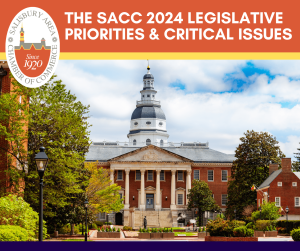
Advocating for the interests and concerns of its members is a pillar of the SACC mission and a member benefit that is hard to measure yet so valuable. Successful advocacy is built on relationships and strength in numbers. We focus on public policy issues that impact the business climate, build credible, non-partisan relationships with elected leaders, and make connections among local business concerns and key decision-makers. We keep our members informed about relevant issues and seek their input to leverage outcomes that promote economic development and job growth.
Our Legislative Priorities and Critical Issues for 2024 include:
- Cyber & Technology: Encourage and remove barriers to the critical deployment of broadband across the lower shore, including 5G accessibility. Ensure that the expansion process is transparent, competitive and market based to ensure equitable access to all parties. The SACC will closely monitor any policy that would reinstate rolled-back federal regulations on the internet that creates challenges and inconsistencies for businesses that work across state lines.
- Data Privacy: The SACC supports protections for children’s privacy rights and supports passing a comprehensive data privacy law, enforced by the State’s Attorney General Office that provides a clear set of rules for all businesses, no matter where they are located.
- Workforce Development: Expand the pool of apprenticeship and career technical education opportunities for the next generation of workers. Expand the definition of a qualifying apprenticeship to capture a larger segment of the work training population and increase the number of employers which can access the related incentive programs. The SACC also supports increasing the ratio of apprentices per regularly employed journeyperson in non-building trades. The SACC supports legislation protecting employers from certain liabilities associated with hiring justice-involved individuals.
- Energy and Environment: The SACC supports development of clean and renewable energy sources and transportation initiatives using market-based mechanisms and incentives and pushing for reasonable timetables. This will offer some protections to the state’s economy and ensure protections of our manufacturing and transportation sectors. Transition to electrification, especially with aggressive timelines, leads to increased cost burdens to businesses and ratepayers and strains the grid’s ability to handle increased demand. Lawmakers must employ fiscal responsibility and prioritize cost-effective solutions and measurers that do not place a large cost burden on the state.
- Increasing Childcare Availability: In previous legislative sessions, the SACC supported legislation and budget incentives to incentivize the opening of new childcare and the expansion of existing facilities. The cost and availability of childcare in 2024 remains a critical impediment to Marylanders return to the workforce. The SACC supports all initiatives to address this issue.
- Paid Family Medical Leave Insurance Program: During the 2022 legislative session the Maryland General Assembly passed a paid family leave program inconsistent with any of the best practices and definitions used in other states. During the 2023 session, modifications to definitions and the implementation timeline were made to the legislation. The SACC continues to support legislation bringing Maryland’s FAMLI program in-line with the federal FMLA, bringing closer to a program that works for both employers and employees.
- Cannabis-Adult-Use Legalization: The SACC supports an employer’s right to maintain their existing testing and workplace policies and oppose any bans on testing or taking employment action because of test results. The Maryland General Assembly and the state must continue to consider the impacts on employers and Maryland’s workforce while implementing and regulating this policy.
- Corporations and Business Entities – Filing Fees, Combined Reporting and Throwback Rule: The SACC opposes the adoption of tax reapportionment schemes such as instituting the “throwback rule”. Adopting mandatory unitary combined reporting, or any other system which creates a systematic and economic disadvantage for businesses. Combined reporting is particularly problematic in uncertain and poor economic climates and will result in lower revenues for the state.
- Sales and Use Tax: The SACC opposes any efforts to expand the sales tax on services not currently listed in Maryland law.
- Remote Work: The General Assembly should address the outstanding challenges with nexus and apportionment rules relating to remote work, and issue general rules instead of the current temporary guidance.
- Agricultural Use Electricity Tax Exemption: The SACC supported this this tax exemption in 2023 for farming operations where the electric meters are not attached to a primary residence. This exemption will be a benefit to the thousands of family farm operations across Maryland and the eastern shore. The SACC supports passing this legislation in 2024 or finding a regulatory channel that accomplishes the same result.
- Transportation and Infrastructure: SACC supports policies that ensure state investment in all critical infrastructure projects, and all priorities to improve safe and efficient movement of people and goods. This includes addressing the state’s structural deficit and addressing the transportation needs of underserved communities, and conducting a comprehensive review to identify sustainable, long-term funding sources.
- Solvency of the Maryland Unemployment Trust Fund: The SACC supports efforts by the state to ensure a healthy balance on the unemployment insurance trust fund. Any new funding proposals must consider the economic landscape and cost implications for all businesses.
- Regulatory Reform: Regulatory reform remains a critical component to attract and retain businesses. It is vitally important that the new administration continue to remove red tape and job-killing regulations.
The January 18th SACC General Membership Luncheon will be held at the Wicomico Civic Center in the DaNang Room, beginning at 11:30 AM, featuring Mary Kane, President/CEO of the Maryland Chamber of Commerce.
Kane will preview the 2024 Maryland General Assembly Session and possible legislation that could impact Maryland’s businesses and organizations.
Tickets are $35 for members and $45 for non-members and can be purchased at salisburyarea.com.




